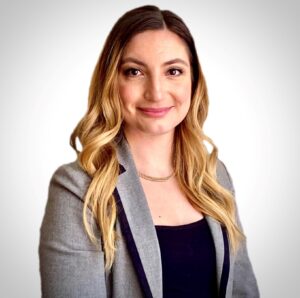Member Insight – Jennifer Mongiovi
 What sparked your decision to become an epidemiologist?
What sparked your decision to become an epidemiologist?
Ever since I was a little kid, I have always been interested in the “why” behind things and still often find myself falling down a rabbit hole of articles and videos when something sparks my curiosity. The opportunity to continue following my curiosity while simultaneously working towards improving population health, or being a “disease detective,” seemed like the perfect path for me. In full transparency, this wasn’t something I always knew I wanted to do with my life. In fact, the field of epidemiology wasn’t something I knew much about until I was finishing college. My major was biology and I had a strong interest in medicine but didn’t see myself as a physician. I spent some time in wet labs but was missing the translational component that bridged research and health. After some very vigorous Google searching, I stumbled on job postings for epidemiologist positions and felt this was something I could see myself doing long term. As they say, “the rest is history.” I applied to graduate programs the next day.
What do you see as the biggest obstacle facing epidemiologists in the next five years?
The Covid-19 pandemic has put a giant spotlight on epidemiologists. In some respects, this is great – the public has become more aware of the research behind health policy, interest in epidemiology programs has gone up, and less people think that epidemiologists are skin doctors. However, somewhere along this journey, epidemiologists have also gotten a reputation as being the villains who are here to give you bad news and ruin your travel plans. Being in the public eye has also meant more criticism, especially when it comes to changes in recommendations as new information becomes available and access to both credible and noncredible sources. I think a major obstacle over the next five years and beyond will be rebuilding the relationship between epidemiologists and the general public, including restoring a sense of trust in epidemiologic research.
Why did you join SER? What keeps you coming back?
Between the meetings, recordings, and podcasts, SER is an incredible resource for both professional development and better understanding of various epidemiologic methods. Involvement in this organization has also been a great platform for connecting with other members at my career level. There are a lot of opportunities for SPC members to grow their networks at the annual meetings as well as leadership opportunities though the Student and Postdoc Committee. As a committee member, I’ve also been able to expand my network by reaching out to faculty across the country (and Europe!) to be a part of SER-sponsored events. I’m looking forward to connecting with many of these individuals in Chicago 2022!
What advice do you give students who want to become epidemiologists?
My advice to students pursuing epidemiology is to talk to as many epidemiologists as you can and keep all your doors open. You never know where you could end up in ten years. Epidemiology is a growing field with an increasing number of opportunities, so if there is an area you are interested in, keep pursuing it!
Do you have any pets?
I have one pet – a big (16lbs) orange tabby cat with no tail named Arnold. He’s fine though – he’s a bobtail and was born this way. Sometimes I think Arnold is part dog since he loves car rides, playing fetch, and a good chew.
Outside of epidemiology what do you enjoy doing?
When I’m not reading papers or making tables, I enjoy connecting with other members of the scientific and local community. I’m also a bit of a foodie and live for new restaurants and recipes. There are few to no foods I wouldn’t try!
What is something that not many people know about you?
My love of takeout may suggest otherwise, but I’m actively trying to live an eco-friendlier lifestyle. Over the past few years, I’ve attempted to make more sustainable swaps in my daily routine, such as biking to work, switching to re-usable K cups, and upcycling veggies scraps to make stock. I’m far from going zero waste, but my hope is that small actions add up in an effort to protect the environment.
